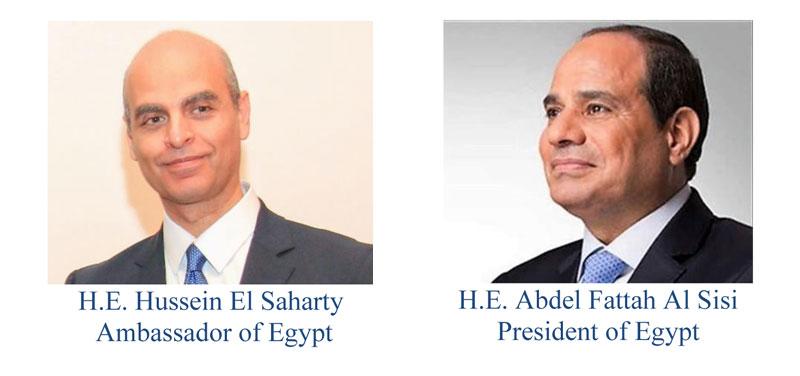Reply To:
Name - Reply Comment

On 23rd July every year, the Arab Republic of Egypt proudly commemorates its National Day. Sixty-nine years ago, Egypt witnessed a peaceful revolt that raised the slogans of dignity, equality, social justice and national sovereignty, enabling the modern Egyptian nation to assume its righteous role as an active player and advocate of peace, political and economic independence, and international justice across the world. Putting those noble principles into action has brought Egypt closer to her counterparts in the Global South who shared the same challenges, visions and aspirations, allowing her to build and foster ties with friendly nations including Sri Lanka. It gives me a great honor on this auspicious occasion to extend my sincere greetings and best wishes to His Excellency the President, the government and the friendly people of the Democratic Socialist Republic of Sri Lanka.
Egypt and Sri Lanka have always enjoyed excellent relations throughout history and across governments. Egyptians and Sri Lankans have traded valuable goods and exchanged cultural, religious and humanitarian practices for centuries. In 1957, Egypt was the first African and Arab country to establish official
During the ongoing COVID19 pandemic, both countries showed much resilience on the foreign trade front and were able to facilitate bilateral flow of commercial goods with significant success, and even operate direct cargo flights between both capitals for the first time since the 1970s.
diplomatic relations with Sri Lanka. Both countries played pivotal roles in launching and leading the Nonaligned Movement and various South-south cooperation schemes. For over six decades, Sri Lanka and Egypt have worked closely in all international fora to disseminate peace, stability and international justice.
Relations between both countries have gained a remarkable momentum since H.E. President Gotabaya Rajapaksa assumed office in November 2019. First Round of Bilateral Political Consultations between our Ministries of Foreign Affairs was held in Cairo in December 2019, where prospects of enhancing cooperation in various fields have been thoroughly explored. In a remarkable phone call between H.E. President Gotabaya and H.E. President Abdel Fattah Al Sisi in March 2021, both leaders reaffirmed their appreciation of the cordial bonds that link Egypt to Sri Lanka and reiterated their commitment to work closely to foster coordination and cooperation in all fields.
Today, Egypt and Sri Lanka are bound by more than twenty bilateral agreements and memoranda of understanding covering trade, investment, tourism, culture, arts, education, civil aviation, political consultation and security cooperation. More drafts are being considered on both sides to upgrade our contractual framework.
During the ongoing COVID-19 pandemic, both countries showed much resilience on the foreign trade front and were able to facilitate bilateral flow of commercial goods with significant success, and even operate direct cargo flights between both capitals for the first time since the 1970s. This has been an exemplary practice during such critical times.
For almost a year and half, Egypt has set a model among developing countries in overcoming the health and economic challenges posed by the COVID-19 pandemic. While consolidating its health sector early on then starting to manufacture one of the internationally leading vaccines locally, the country has created a mechanism for safe inbound tourism since July 2020 and has proceeded in implementing its mega infrastructural and developmental projects. In this context, Egypt has launched the “Dignified Life Initiative” earlier this year, the biggest developmental project in its history aiming at improving the quality of life in rural communities within the objectives of “Egypt Vision 2030”. Last week, the United Nations has listed the “Upper Egypt Local Development Program” on its platform for the best practices to achieve the Sustainable Development Goals. More than twenty new cities, including the New Administrative Capital of Egypt, are currently being constructed to accommodate about thirty million Egyptians by 2030.
As Egypt and Sri Lanka are currently facing the same set of challenges and are working closely to exchange experiences and best practices, I hereby confidently state that our long-standing bilateral relations are on the right track. Meanwhile, we will not spare any effort to enhance those relations and carry them to wider horizons for the benefits of our nations and peoples.
